Technical Notes - e1
Impact of the NLM ILS on CATLINE® /AVLINE® /SERLINE® - e2
CANCERLIT® and PDQ® To Be Removed from the NLM Databases - Available from NCI's Web Site - e3
Introducing Internet Grateful Med Version 2.6 [corrected 1998/11/24] - e4
NLM Online Training Program - 1999 - e5
![]() Gold Standard Search - e6
Gold Standard Search - e6
Gold Standard Search
Thank you to everyone who mailed in search strategies in response to the Gold Standard
Search article in the January-February issue of the NLM Technical Bulletin. This article is being
published in the July-August issue, instead of the May-June issue as originally scheduled because
there were so few responses to this contest and it was hoped the additional time would allow the
any late entries to be considered (see Comment on Response to the Gold Standard Search).This
feature offers searchers a chance to match wits with NLM staff on a search strategy formulation
using PubMed or Internet Grateful Med (IGM). The Gold Standard search strategies are
developed here at NLM. The search request published in the January-February 1998 issue was:
Customer satisfaction with health maintenance organizations.
The Winner
Cheryl Banick of Warwick, RI, was the winner of this search. She ran her search first in PubMed
and then in Internet Grateful Med eliminating the MEDLINE overlap there. Ms. Banick's search
is shown in Figures 11 and 12.
Introduction to the Search
This search was selected to illustrate the use of the upcoming Internet Grateful Med version 2.6
search engine on the Web. This version became available on September 2, 1998. When
you go to http://igm.nlm.nih.gov [April 17, 2006: This link was removed because it is invalid.] you will be brought to the new Internet Grateful Med home page shown in Figure 1.
Figure 1 - Internet Grateful Med Version 2.6 Web site
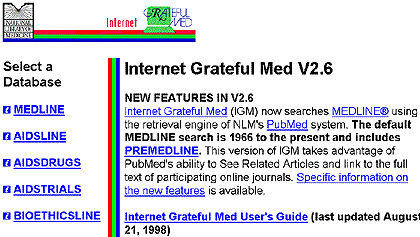
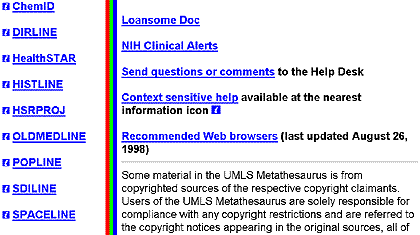

Choosing a File
The subject of this search, customer satisfaction with health maintenance organizations, should
suggest the HealthSTAR database to searchers. HealthSTAR provides access to published
literature of Health Services Technology, Administration, and Research and is produced
cooperatively by the National Library of Medicine (NLM) and the American Hospital Association
(AHA). HealthSTAR contains citations (with abstracts if available) to journal articles,
monographs, technical reports, meeting abstracts and papers, book chapters, and government
documents from 1975 to the present.
To ensure your search results are as up to date as possible and to retrieve the latest, in-process citations, you would need to run your strategy against the PREMEDLINE data also. These two sources together would give you the most complete retrieval. Only NLM's MEDLINE database on the Web includes PREMEDLINE citations.
There are two possible approaches to searching for HealthSTAR and PREMEDLINE data.
- The first approach is illustrated by the Gold Standard search using IGM 2.6. Search
HealthSTAR first, using MeSH headings selected as the major topic to increase the precision and
relevance of the retrieval. Then search the MEDLINE/PREMEDLINE file in PubMed; do not
limit to MeSH headings in order to retrieve the most recent unindexed material, and use the
Entrez date limit feature to retrieve the latest citations.
- The second method is to run your search first in the combined MEDLINE/PREMEDLINE file (searching on both MeSH headings and Text Words) and then in the HealthSTAR file. Ms. Banick followed this basic strategy, using PubMed as the search engine, since the IGM 2.3.2 search engine available for her use at the time searched against a segmented MEDLINE file and PubMed searches the complete PREMEDLINE/MEDLINE data at once. Then she went to HealthSTAR in IGM and ran her strategy there using the MEDLINE overlap feature to eliminate the MEDLINE citations and retrieve only the unique HealthSTAR citations from that file.
HealthSTAR is a segmented file with two parts, 1990 forward and 1975-1989. The Gold Standard Search retrieved sufficient data in the current file (139 citations as of July 98) that the decision was not to search the backfile. Ms. Banick also searched only the current HealthSTAR data in her search. In PubMed she did not limit by year; however, because Health Maintenance Organizations was introduced as a MeSH heading in 1974, and she searched using this term, the PubMed retrieval was limited to 1974 and forward. Ms. Banick retrieved 90 citations in PubMed and 95 additional unique citations from HealthSTAR.
Analysis of the Search Strategies
The search strategy here is fairly simple. There are two relevant MeSH headings that come
immediately to mind: Health Maintenance Organizations and Consumer Satisfaction. If you click
on HealthSTAR as shown in Figure 1, you will be brought to the IGM HealthSTAR search screen
shown in Figure 2. Enter your first search term: health maintenance organizations and click on the
Find MeSH/Meta Terms button as shown in Figure 2.
Figure 2 - Internet Grateful Med Search Screen
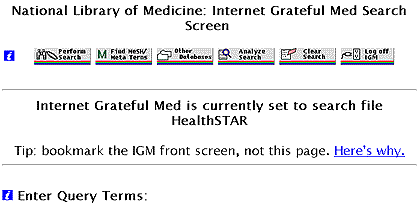

After clicking on the Find MeSH/Meta Terms button you will see the screen shown in Figure 3.
Figure 3 - IGM Metathesaurus Browser Screen
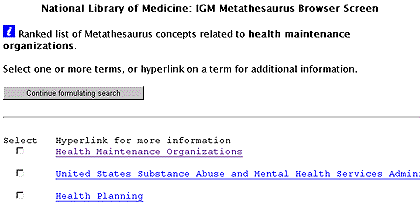
Figure 4 shows that when you click on the term, Health Maintenance Organizations you will see the headings that this term is indented under (the parent term) and the other terms idented under the parent heading and the headings further indented under the term you are viewing, if any. (Health Maintenance Organizations does not have any terms indented under it - See Figure 8 for a display of a term with an indention.) This display is the equivalent of seeing a MeSH tree displayed from the top down to the term that you are requesting.
Figure 4 - IGM Metathesaurus Screen Display for Health Maintenance Organizations
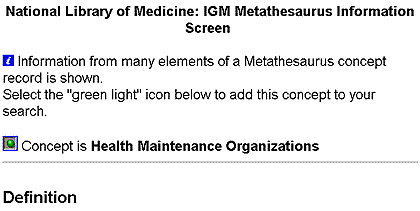
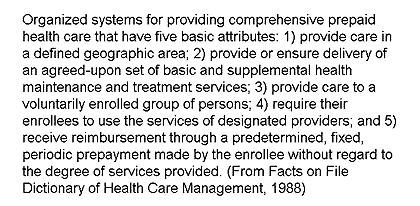
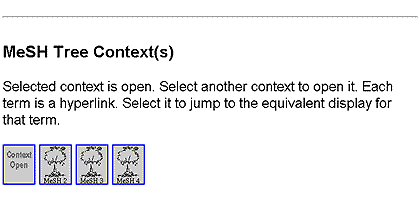
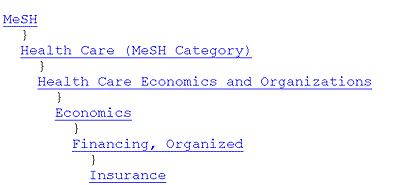

The explodable parent term displays directly above and slightly to the left of the terms that will also be retrieved if you select that term; Internet Grateful Med automatically includes the more specific terms under the parent term (e.g., if you select Managed Care Programs you will include all the citations indexed to that term and all the terms on the same line with Health Maintenance Organizations). If you scroll to the right on the screen shown above, you will see that the complete text on the line displaying Health Maintenance Organizations reads as follows:
Health Maintenance Organizations - Competitive Medical Plans - Independent Practice Associations - Preferred Provider Organizations
Those terms plus the parent term would all be retrieved if you select Managed Care Programs (the parent term). Please note that the terms on the same level of a MeSH tree display horizontally across the screen in IGM. This differs from the display in the printed MeSH Trees as well as in the PubMed MeSH Browser which display terms on the same level vertically as shown below:
- Managed Care Programs
- Competitive Medical Plans
- Health Maintenance Organizations
- Independent Practice Associations
- Preferred Provider Organizations
It is generally advisable to look at the MeSH/Meta terms before doing your search. Looking at this list will let you know what other related terms are available and could help you to broaden or narrow your search, especially if your initial retrieval is not ideal. Click on the round (green light) globe button (radio button) next to the concept definition, shown in Figure 4, to add Health Maintenance Organizations to your search and you will see the screen shown in Figure 5. Cautionary note: If you select your term from the Metathesaurus, then you will be searching your term only as a MeSH heading. If you leave your term as entered originally on the search screen, IGM will search it as a MeSH heading, exploded if it has narrower terms, and will AND together the phrase words as individual Text Words and will search it also as a keyword. In other words, health maintenance organizations (not selected from the Metathesaurus) will be searched as: health maintenance organizations (mh) or health (tw) and maintenance (tw) and organizations (tw) or health maintenance organizations (kw). The Gold Standard search used only MeSH headings not Text Words or Keywords (to increase specificity and limit the amount of retrieval).
In the screen in Figure 5, the box is checked to show that in this search the MeSH term must be a major topic in the citation. Clicking on this box is the equivalent of starring a MeSH heading in ELHILL (i.e., *health maintenance organizations). You also have the opportunity here to add subheadings (concept qualifiers) to your MeSH selection; however, since that is not being done for this search, it will not be covered in this article. Click on Return to Search Screen to continue adding terms to your search.
Figure 5 - Selecting your term as a Major Topic in the Citation
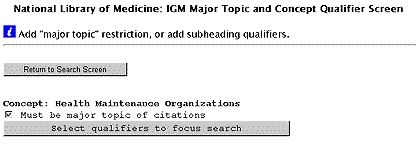
After clicking on Return you are brought back to the search screen and given the opportunity to enter another term. If you are not familiar with the exact MeSH heading for your term and you enter the phrase on the second subject line (Figure 6) as stated in the original search request, "customer satisfaction," and then click on "Find MeSH Meta Terms" you will see the display shown in Figure 7. The MeSH/Meta Terms display portion for the other term in this search, Consumer Satisfaction, is shown in Figure 8. Consumer Satisfaction has the term Patient Satisfaction indented underneath it and this term will be retrieved because of IGM's automatic Explode feature.
Figure 6 - Searching for a Non-MeSH Phrase as the Second Subject
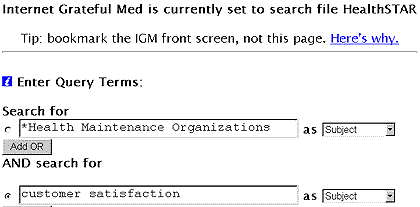
Figure 7 - Metathesaurus Display for Concepts Related go to Customer Satisfaction
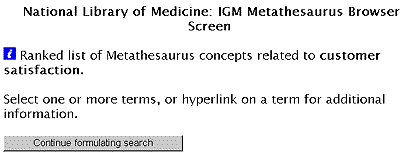
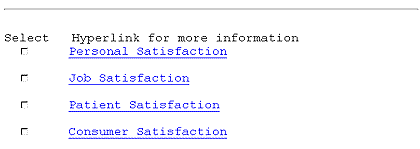
Figure 8 - Metathesaurus Display for Consumer Satisfaction
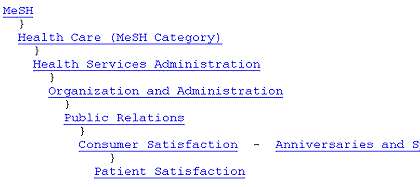
If you do not want to include the more specific term, patient satisfaction, in your search, put a forward slash ( / ) in front of it on the subject line, i.e., type /consumer satisfaction. The forward slash means that ELHILL search syntax will be used for whatever follows the slash (in this case, the automatic explode would NOT be applied). However, for this search, the indented term, Patient Satisfaction, is desired so Consumer Satisfaction is selected and made a major topic as was done with Health Maintenance Organizations.
Once back at the search entry screen, click on Perform Search (screen shown in Figure 2). In late July 1998, 139 citations were retrieved from 1990 forward. IGM displays the retrieval in the brief format shown below in Figure 9. IGM 2.6 will display data from the MEDLINE database 20 citations at a time; all other files will display citations eight at a time. The citation selected for display below is one available only in HealthSTAR; you could not retrieve this in MEDLINE. Of the 139 citations retrieved in the Gold Standard search, over 90 were unique to the HealthSTAR database.
Figure 9 - Sample Citation Retrieved in HealthSTAR
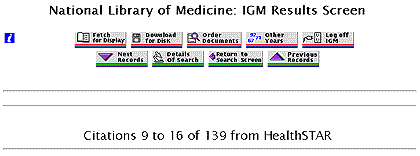
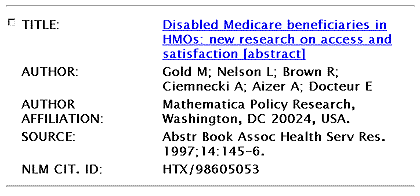
Displaying Your Search Strategy
To display your search strategy, click on the Details of Search button on the results screen (see
Figure 9). For this Gold Standard search you would see the screen shown in Figure 10.
Figure 10 - Details of Search Screen Displays the Search Strategy
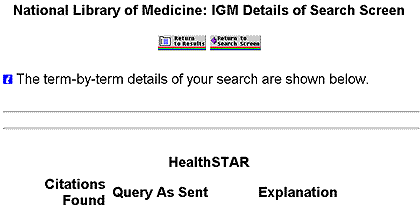
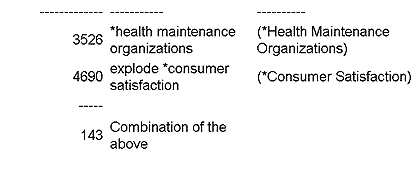
Retrieving the Most Recent Citations From PREMEDLINE
At this time an easy way to retrieve only the most recent citations being prepared for MEDLINE
(not yet indexed with MeSH headings) is to go back to the PubMed Basic Search screen at
http://www.ncbi.nlm.nih.gov/entrez/query.fcgi,
enter a text word strategy into the blank search box and click on the box Entrez Date Limit and select 60 or 90 days as the date limit (the optimal time frame may vary with the subject and the journals in which that subject appears). For the Gold Standard search, the following strategy was run: health maintenance organizations AND consumer satisfaction and the 90 day limit was selected. No additional relevant material was found. In the future, it is anticipated that the ability to limit your search to PREMEDLINE citations will be
added as a search enhancement to PubMed and subsequently to IGM.
Limiting to English
To limit to English language references, go to the bottom of the search screen and you will see the
Apply Limits feature shown in Figure 12. In this case all the articles retrieved were in English, so no citations were eliminated by limiting to English and this screen is not shown here in the Gold
Standard Search description. Figure 12 illustrates limiting to English and using the MEDLINE overlap feature as done by Ms. Banick in the winning strategy.
An Alternative Search Strategy
Ms. Banick approached the search from the opposite direction. She went first to PubMed and
using the screen shown in Figure 11 (formatting limitations do not allow the whole strategy to show in the search box), searched on health maintenance organizations and customer satisfaction
as Major terms and retrieved 145 citations from 1966 forward (at the end of April). Using the See Related Articles feature helped Ms. Banick find the MeSH headings. She first entered just the word customer and clicked on See Related Articles for a few relevant articles and examined the MeSH headings to find Consumer Satisfaction. Ms. Banick ran her search twice, once as major MeSH headings and once qualifying the terms as Text Words. However, by searching with the MeSH headings but NOT qualifying them as [majr] as shown below, you can run your strategy just once and retrieve each term as a MeSH heading and also as a Text Word
phrase. This way you will retrieve from both MEDLINE and the PREMEDLINE data at the same time. However, your retrieval will be broader and less precise, if you use this method. There are no perfect solutions.
Figure 11 - Running the Strategy in PubMed
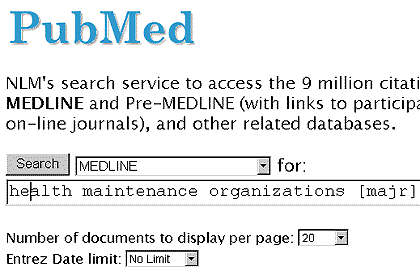
Then Ms. Banick went to HealthSTAR via IGM2.3.2 and ran the same MeSH heading search featured in the Gold Standard search and used the feature shown in Figure 12 to eliminate the MEDLINE overlap. In the Apply Limits section at the bottom of the IGM Search Screen you may click on any of the boxes and select a value other than the default value. In the MEDLINE overlap box, the default setting is Include MEDLINE References, so you need to click to select Exclude MEDLINE References if that is what you want to do.
Figure 12 - Eliminating the MEDLINE Overlap from HealthSTAR Retrieval
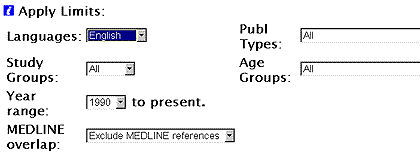
Epilogue - Future Plans
IGM 2.6 searches MEDLINE and PREMEDLINE via PubMed with all other databases being searched via ELHILL on
NLM's mainframe computer. NLM is planning to transition all journal citations from the files
offered on IGM, such as HealthSTAR and AIDSLINE to PubMed. This change will lead to
further changes in strategies for formulating searches. Watch for future articles on this subject.
Comment on Response to the Gold Standard Search
There was a disappointingly low response rate for this last Gold Standard Search and we are
considering restructuring the way search information will be handled in the Technical
Bulletin. An alternative to the Gold Standard Search is to provide you with a Search Hint with
straightforward coverage that will highlight a particular system feature. Please let us hear from
you about your preferences regarding the continuance of the Gold Standard Search or alternative
methods for relaying search features and information. You may contact us at:
nlmtechbull@mail.nlm.nih.gov
with your comments and/or suggestions.
The Next Gold Standard Search
The search request is:
The consequences of repeated weight loss and weight gain with dieting.
Results will be published in the November-December NLM Technical Bulletin. Entries must be received by October 15, 1998 to be considered.
Search Hints
Choose either PubMed or Internet Grateful Med. If you choose PubMed indicate which search
screen you used (Basic, Advanced, or Boolean) and if you used any features such as the MeSH
Browser, See Related Button, or links to other sources. If you choose IGM, please indicate which
database(s) you searched and whether you used the Metathesaurus. Limit your retrieval to English
language citations.
Reminder
There are no exact answers or absolutely correct strategies, only best approximations, just
like real life. Good luck!
If your strategy is selected for publication you could win an NLM T-shirt or coffee mug. In cases of multiple submissions of identical winning strategies, the prize winner will be either the person who is a first time winner or the first winning strategy received.
Mail us a copy of your search strategy and include a printout of citations. Please note that in the interest of saving time and postage we are no longer asking for abstracts.
With PubMed or IGM as your search engine, if you are unable to print the Details box or the screen displaying your search strategy (try Control P (PC) or Command P (Macintosh)), please type your strategy on paper for submission and mail it to:
- Gold Standard Search
- MEDLARS Management Section
- National Library of Medicine
- 8600 Rockville Pike
- Bethesda, MD 20894
- --prepared by Toby Port
- MEDLARS Management Section
